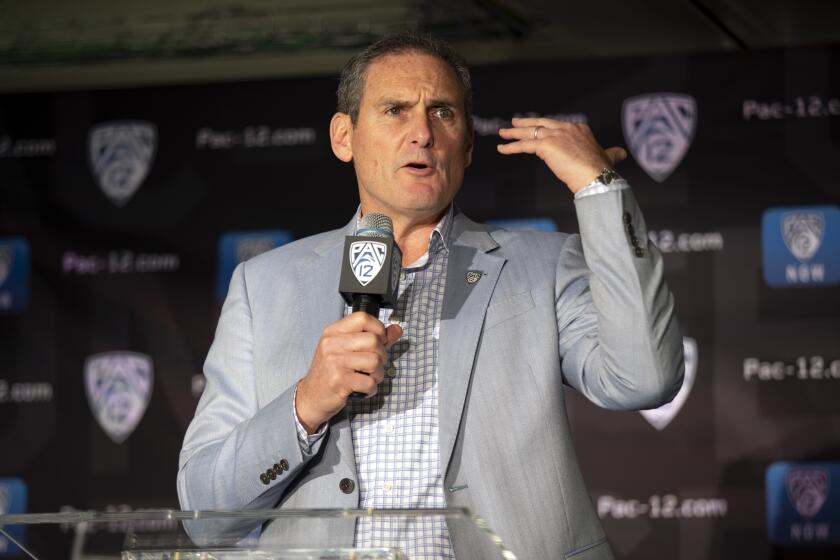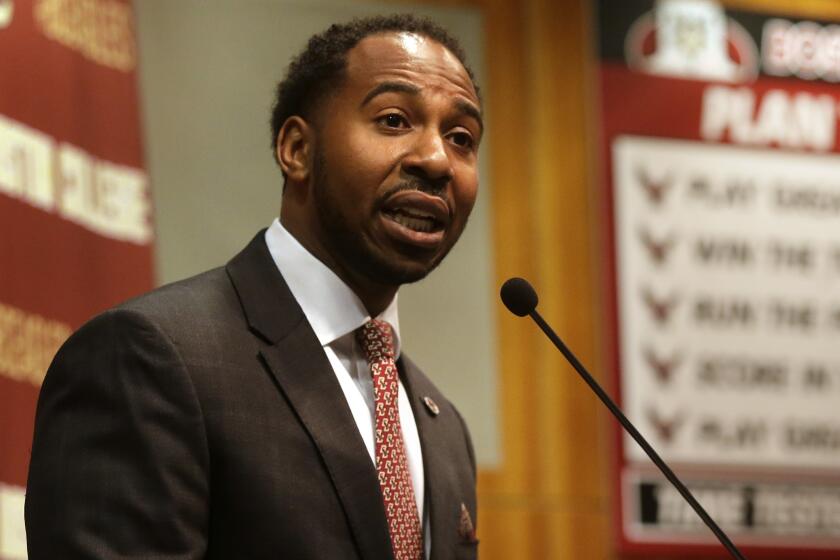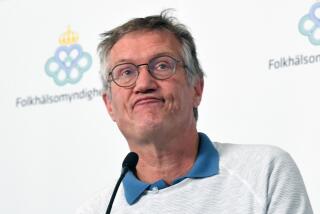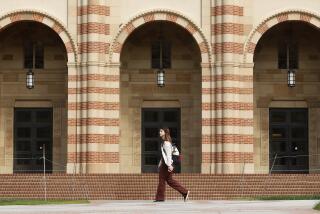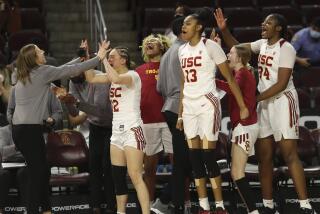For UCLA and USC international student-athletes, pandemic creates challenges
- Share via
Nicolas Saveljic points his cellphone camera toward the stove. His mother, Dijana Dika Saveljic, calls from Montenegro and tells her son to add “a little bit” of seasoning as he cooks a favorite dish from his Westwood apartment. The UCLA men’s water polo player, unsure of the measurement, dumps in too much. A lighthearted argument follows.
Saveljic, a junior, learned his cooking — and his strength — from his mother. Dijana survived breast cancer eight years ago. She is his idol. And she is why Saveljic accepted not being able to immediately return to his hometown of Kotor, as everyone sought safety during the COVID-19 pandemic. He knows his mother is part of a high-risk group.
“When I see people complaining about this stuff, that you have to be home, I just remember the life of the person that I love the most was on the line,” Saveljic said.
International athletes at UCLA and USC have navigated complex circumstances, from families to flights, in the aftermath of their coronavirus-canceled seasons and classes. Those who go to school in the United States but call other countries home have a first-class understanding of the scope of a global pandemic.
While watching the outbreak unfold from New Zealand, USC golfer Amelia Garvey said, “This is the time that you really, really appreciate being from a small country.”
New Zealand had just 21 total deaths as of Wednesday, according to the World Health Organization, and the country hasn’t reported a new death since May 6.
“This is where we can all come together and make a huge impact,” Garvey added.
Less than 48 hours after the NCAA canceled winter and spring championships, Garvey, a junior who helped USC to a No. 1 ranking, was on a flight home. She packed up her apartment, scattering everything that didn’t fit into two large suitcases between friends and the team’s locker room, and arrived five hours before New Zealand enacted its strict lockdown.
She was lucky.
As Montenegro closed borders to non-citizens starting March 16, Saveljic’s first two attempts at returning were canceled. After several lonely weeks in his apartment completing online classes and learning to screen-print T-shirts, Saveljic, with help from the Montenegrin embassy, returned home May 15.
Bernardo Maurizi, hoping to return to Florence, Italy, had several flights canceled but wrangled a trip from L.A. to New York, and, after a 10-hour layover in a hotel, the UCLA water polo goalie got to Rome on March 25. That was the only airport in Italy open as the country struggled to contain the virus.
At the airport, Maurizi could not wrap his father in the famous Italian hug that includes one kiss on each cheek. Only one family member was allowed out as Italy implemented a full lockdown. Maurizi’s father carried certification explaining the purpose for being on the road, and a police officer stopped the family during the 2½-hour drive to confirm prior approval. When Maurizi returned to his parents’ home, he walked past his mother and two of his brothers to his room. He started 14 days of isolation.
The freshman flew more than 6,000 miles to be with his family and couldn’t even be in the same room. But one wall’s separation was nothing compared with half a globe’s distance, so flying into one of the hottest coronavirus hot spots was worth it for Maurizi.
“I knew how things were developing through the world,” he said. “I guessed that the situation could be worse in the United States. … It was the best decision for my family, to be safe next to them.”
Pac-12 Commissioner Larry Scott said that student-athletes would be safer and in a healthier situation if they were on campus in the summer.
As Maurizi passed the time during isolation by completing online classes, speaking to friends and family through FaceTime and working out in his room, he took solace knowing most everyone in his country was similarly confined. He wasn’t tempted by the possibility of dining at his favorite restaurant or meeting friends.
Victor Johansson, a USC swimmer who stayed in L.A., looked at his home country with slight envy. Sweden bucked the lockdown trend, keeping restaurants, bars and some schools open while banning large gatherings and encouraging responsible social distancing. At-risk citizens were instructed to stay home.
Johansson, a sophomore who won the Pac-12 title in the 500-yard freestyle race as a freshman, hoped to stay in L.A. through the summer while training for the Olympics. Instead, he was shut out of pool access, while his compatriots could practice at home.
To see his country take such a unique stance surprised Johansson, but he believed the Swedes’ general trust in the government likely allowed the policy to keep the country’s death rate from soaring like in other European countries.
“If the government suggests you should do this, like you shouldn’t be outdoors, then we’ll follow it,” said Johansson, who plans to return to Sweden in June. “Why wouldn’t we?”
As of Wednesday, Sweden’s 40.51 COVID-19 deaths per 100,000 people ranked sixth highest in the world, behind Belgium, Spain, the United Kingdom, Italy and France, according to Johns Hopkins University.
Other countries that used strict lockdown policies to limit the virus are beginning to open. Nicole Pavlopoulou, a USC swimmer from Greece, spent a month leaving the house only for short runs or going to the grocery store. Greeks were required to fill out a form or text a phone number each time they left their homes to report where they were going and which essential task they were doing.
As of Wednesday, Greece had just 1.61 deaths per 100,000 people, according to Johns Hopkins. The country is starting to open its borders to tourists again.
“Our sacrifices paid off,” said Pavlopoulou, who rejoined the Greek national team for socially distanced training in May at the Olympic swimming stadium in Athens. “Hopefully it will continue that way.”
After cautiously waiting to return to his family, Saveljic is close to reaping the benefit of his sacrifice. Immediately upon arriving at the airport in Podgorica, Montenegro’s capital, travelers are whisked onto buses for a three-hour drive to a converted rehab facility used to isolate travelers. Saveljic has a 14-day isolation in a room locked from the outside and guarded by soldiers.
New UCLA athletic director Martin Jarmond comes in with a sizzle, but it will all fizzle out if he can’t help Chip Kelly make the football program a winner.
The only in-person interaction Saveljic has with his family is seeing his mother and older sister as specks on the sidewalk below his ninth-floor balcony. His mother dropped off workout equipment and healthy home-cooked meals to the lobby, and Saveljic stacked the boxes of food like Tetris pieces in his small fridge.
The food from his family and the laughter he hears from neighboring rooms make Saveljic happy to be back on Montenegrin soil. He feels safe there, even though he’s not quite home yet.
“I’m going to get out of here,” Saveljic said last week, four days into isolation, “and I’m going to squeeze my mom, my sister and my family as hard as I can.”
More to Read
Go beyond the scoreboard
Get the latest on L.A.'s teams in the daily Sports Report newsletter.
You may occasionally receive promotional content from the Los Angeles Times.

